|
| |||
 |
Atlas F1 Exclusive Max Mosley: Face to Face | ||
| by Thomas O'Keefe, U.S.A. | |||
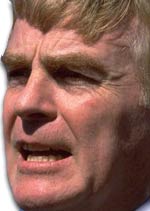 In the build-up to the European Commission's final decision regarding the antitrust case against F1, FIA president Max Mosley talks exclusively to Atlas F1 about the anticipated settlement and other subjects of current interest. In a four-part series of features, Thomas O'Keefe outlines Mosley's path through the ranks, his childhood in a controversial home, the EC v. F1 case, Bernie Ecclestone, women in racing, and untimately, yes, his views about going back to Slicks In the build-up to the European Commission's final decision regarding the antitrust case against F1, FIA president Max Mosley talks exclusively to Atlas F1 about the anticipated settlement and other subjects of current interest. In a four-part series of features, Thomas O'Keefe outlines Mosley's path through the ranks, his childhood in a controversial home, the EC v. F1 case, Bernie Ecclestone, women in racing, and untimately, yes, his views about going back to Slicks
Part II - Mosley's Biggest Case: The EU Antitrust Proceedings Against F1
As an American lawyer who writes about Formula One, I have followed with interest the antitrust proceeding brought by the European Commission against Formula One, naming as respondents the Federation Internationale de L'Automobile ("FIA"), of which Max Mosley is President, Formula One Management, Ltd. ("FOM") and International Sportsworld Communicators, Ltd. ("ISC"), which are entities run by Bernie Ecclestone.
While the European Commission antitrust proceeding has been languishing in the bureaucracy of the European Commission for 6 years, there were sabers being rattled on both sides earlier this year that indicated the matter would finally come to a boil at an oral hearing to be conducted before the European Commission in Brussels, originally scheduled for May 2000.
At the hearing, the European Commission was to consider the efficacy of the 188-page Statement of Objections prepared and filed by the staff of the Competition Directorate of the European Commission against the FIA, FOA and ISC.
The Statement of Objections argues that respondents have violated the European Union antitrust laws and have abused their market position and restricted competition in several ways, to wit, the FIA allegedly abuses the licensing power it has to authorize FIA-organized events to thwart the development of a competing non-FIA motorsports series and the FIA has appropriated to itself ownership of the commercial rights to FIA events - including the rights to TV broadcasting and other commercial exploitation of those events - and contractually assigned those rights exclusively to FOA and ISC in a manner that also constitutes what former European Commission Competition Chief Karl Van Miert has characterized as "serious infringements of EU competition rules, which could result in substantial fines."
In a world of 500-person law firms and accounting and investment firms organized on a global scale, all of them engaging in thousands of commercial transactions, what are the odds that an individual lawyer who actually drafted an agreement in 1981 for a multi-billion dollar sport would end up being the single most important defender of the document he created once it got into litigation 20 years later? Slim odds you would think, but that kind of uniqueness seems to follow Max Mosley around in life.
As often seems to be the case, given the relatively short history of modern Formula One, Mosley is the quintessential Witness to History on most things of importance to the sport; i.e., he was either there at the outset helping to come up with a concept or he was asked as a lawyer to reduce it to writing. Whatever his role, he remains a living, breathing legislative history of the foundational documents and regulations that govern Formula One, both on the commercial side and on the sporting side.
The depth and perspective that Mosley brings to the subject makes him the Most Valuable Player on the Formula One defense team. Although all the respondents have eminent and expensive counsel from Brussels and London on retainer, their Chief Counsel is in-house: Max Mosley himself has dusted off his law books and taken the lead in marshaling the defense of the FIA, at times working with the FIA's lawyers in Brussels on virtually a daily basis in preparing the voluminous pleadings and submissions that set the stage for a hearing on this matter.
What is the value of this case to Formula One that justifies the lengths to which the defense team has gone? Certainly, hundreds of millions of dollars are at stake for those who own the sport and, from the Formula One fan's standpoint, fundamental changes as to where and how the Formula One Championship is run would be in the offing if the case goes against Formula One.
In addition to participating in the briefing of the issues, Mosley has also engaged in a very robust exchange of letters between himself and Professor Mario Monti, a member of the European Commission who is the head of the Directorate General for Competition, the division of the European Commission that has brought the antitrust charges against the FIA, FOA and ISC.
Professor Monti, who is 57, has been in office less than a year and is regarded by Mosley as a breath of fresh air by comparison to Karel Van Miert, the prior Competition Commissioner. Professor Monti comes to the European Commission from academia and the corporate boardroom, having been President of Bocconi University, a prestigious university of economics and business in Milan, and having served as a member of the boards of directors of Italian banks and insurance companies and, notably, on the board of Fiat Group, the parent company of Ferrari.
By contrast, Mosley seems to have concluded that Van Miert played politics - tobacco politics - with Formula One, was frontally combative towards Formula One, was responsible for leaking confidential documents to the press about the European Commission Proceeding and had seemed to pre-judge the case against Formula One, without attempting to understand the sport. Max retaliated in kind, calling Van Miert "a spent force" in his closing months in office and ridiculing Van Miert and the Commission's staff as incompetent, unprofessional and guilty of something called "maladministration of justice" - which in terms of American law suggests that officials used their position wrongfully.
What, then, is the European Commission proceeding all about?
What is wrong with the FIA's approach? The Commission asserts that the FIA's contracts, statutes, and regulations, including the FIA's contract with FOA and ISC and the contracts of FOA and ISC in turn with the broadcasters - all these operate in a manner that restricts competition in European Commission countries and is in violation of certain Articles of the European Commission Treaty, which are intended to nurture an open and competitive market for goods, services and labor across borders in the entire European Union territory.
The Commission believes that the FIA's contracts abuse its dominant position in the market for the organization and promotion of international motorsport series as well as the market for licensing and organizing any such series, by shutting out competitors, because the various levels of contracts have the effect of "suppressing competing products which would otherwise be offered to broadcasters and other interested parties by promoters or organizers," and preventing "rival championships to FIA series from developing."
The BPR Complaint
Along the way, the European Commission has heard from two private complainants who have tried to put flesh and bone on these rather abstract antitrust law principles, BPR and AE TV. The Commission, in turn, has seized upon these two private complaints to buttress its case. One private complainant, BPR, ultimately withdrew its complaint and has settled its case with ISC.
Nonetheless, the Commission uses BPR's complaint as illustrative of how the FIA's behavior reflects an abuse of a dominant position in the market by the FIA to lockout the competition. BPR charged that it had tried to start a new GT series and that the FIA refused to license it (the FIA was allegedly considering its own GT series at the time) and that ISC advised that BPR could not exploit the television rights to the series without ISC's consent if the GT series was organized as an FIA authorized series.
The Commission took this episode to be a textbook case of the FIA abusing its licensing powers to eliminate a fledgling competitor that posed a threat to the proposed new FIA GT Championship. As described by the European Commission, the FIA's treatment of BPR left BPR with a Hobson's Choice: accept the FIA's appropriation of television rights and negotiate the best deal possible for rights to run the GT series, or attempt to organize the series without FIA authorization, with all the attendant risks to any individual or team participating in a non-FIA GT series, including the possible sanction that a participant's FIA license could be revoked.
The FIA's lawyers response to the Commission's taking up the mantle of BPR's case is as follows: they say that "the Commission has either entirely misrepresented or entirely misunderstood the facts surrounding the FIA's relationship with BPR/GTR," that the FIA GT Championship continues to this day with two of the three original partners and that the whole so-called BPR allegation reduces itself to a partnership dispute among the three former partners.
Contrary to the Commission's Statement of Objections, the FIA maintains that it did not use its licensing authority in an abusive way to deny the GT series approval because in fact the series was approved and is still running, although the minority partner apparently remains unhappy with the outcome.
In essence, the FIA argues that the Commission has backed the wrong horse by getting involved in an internecine partnership dispute among co-venturers who wanted to run a GT series and trying to use the facts of that commercial dispute to demonstrate antitrust violations by the FIA, which have not in fact occurred. "The FIA would never refuse a genuine application for an international series where no safety issues arise," and, according to the FIA, it did not do so in the case of the FIA GT Championship series since, in the end, two of the three partners ended up running the FIA GT Championship.
According to the FIA, the essentially private nature of BPR's complaint is exposed in all of its commercial splendor by the private financial settlement of a litigation the disaffected minority partner had with Bernie and the withdrawal by BPR of its private complaint to the European Commission. "The settlement, which involved a very substantial payment, was repeatedly urged by senior staff in D[irectorate] G[eneral] Competition and was only agreed to in the hope of an early settlement with the Commission."
Translation: the BPR case is a dead letter as precedent to begin with because the complaint has been withdrawn and the Commission's staff's active intervention in settling the matter for cash money makes the use of the BPR case to support the Commission's Statement of Objection all the more ludicrous and unfounded.
There is even a suggestion lurking in the FIA's papers that the Commission and its staff have sought unduly "special treatment" for the disaffected minority partner of BPR in other ways that reflect poorly on the professionalism of the Commission's staff. But whatever the truth of the matter, BPR's complaint has receded into the background and, with the ISC litigation disposed of, BPR should not play a significant evidentiary role in the European Commission hearing given the private settlement.
The AE TV Complaint
According to the European Commission, AE TV is a German television production company specializing in the marketing of international motorsport championships such as the European truck racing championship. Wolfgang Eisele, AE TV's principal, minces no words. He calls his adversaries the "Ecclestone-Mosley empire" and has stated that "the Commission has noted after thorough investigations, what is obvious anyway, that the Mosley/Ecclestone cartel seems to be illegal and has to be stopped."
As with BPR, AE TV's complaint has its origins in commercial matters, not abstract antitrust principles. AE TV alleges that the FIA and ISC denied AE TV television rights for the European Truck Racing because it feared the European Truck Racing Cup was a serious competitive threat to the popularity of other FIA-sponsored events like the Formula One Championship. Furthermore, AE TV argues that the "broadcasting resolutions" of the FIA governing the acquisition of television rights to international motor sport events drive out of the market independent television production and marketing companies specializing in motorsports events, like AE TV.
It seems that prior to 1989, part of AE TV's business as a television production and marketing company was to film truck racing events that formed part of the European Truck Racing Cup; the footage was ultimately sold to car manufacturers and other advertising clients. AE TV's arrangements were made with the individual organizers of the particular truck races. At some point in 1987 the FIA was requested by the manufacturers and organizers/promoters of the European Truck Racing Organization to consider the series becoming an official FIA Championship run under the auspices of the FIA.
In 1989, truck racing series did become the FIA European Truck Racing Cup. For the next six year, AE TV's role was undisturbed. However, as of 1996 AE TV found itself out in the cold, no longer being able to deal with individual promoters for television rights but instead thrown into the arms of ISC, to whom the FIA had entrusted the task of deciding how the series should be televised, as contrasted with the promoter-by-promoter approach that AE TV had operated under previously.
AE TV put in its bid with ISC to televise the new truck racing series, but, according to the FIA's version of events, "the [AE TV] bid was rejected in favor of a rival bidder, on the basis of price and of the quality of coverage which it offered." According to Mr. Eisele, before filing his court case in early 1997, he met with Bernie in London but negotiations were unsuccessful, thus leading to the array of litigation and enforcement proceedings in which AE TV, the FIA, the FOA and ISC are now enmeshed.
According to the FIA's response to the Commission's Statement of Objections, "The Commission should be aware that AE TV has indicated that it would discontinue proceedings if it receives a big enough settlement. AE TV is only interested in how much money it can squeeze out of the FIA. Its intentions are far from honorable and its claims are without merit as the German courts have consistently found. It has pursued multiple litigation in order to cause maximum disruption."
There has been harsh language all around. Mr. Eisele is no shrinking violet, and he says he is determined to see his case through to a final determination in the European Commission and in the courts. Indeed, with a whiff of settlement in the air between the European Commission and the FIA, Mr. Eisele and his counsel have recently let it be known that they intend to hold the Commission's feet to the fire and not let the FIA off the hook with a settlement that does not fundamentally shake up the firmament:
In essence, in a motorsport world designed by Mr. Eisele, what AE TV proposes (and what the European Commission seems to be recommending) is to restructure the system of running international motorsport events, at least in the 15 Member States of the European Union, in a way that would empower local organizers, promoters and TV production companies at the expense of the now-supreme FIA. As restructured, international motorsport would work as follows, according to AE TV and its counsel:
"With regard to the FIA series, the local promoters may no longer be forced by the FIA to cede their television rights to the FIA. This outrageous situation where revenues from these television rights simply remain with the FIA's Vice President [i.e., Bernie, who is one of 14 Vice Presidents of the FIA] (as confirmed by the Frankfurt Court of Appeal in its judgment of 15 December 1998 in the AE TV case) must be over. The FIA must be reduced to what it is supposed to be anyway according to its own statutes - a non-profit making organization setting sporting rules. The rights to the FIA series must no longer be handled by the FIA and its senior management (and their companies)."
Specifically, several of the European races that are considered the core of any Formula One season would be eliminated in the New World Order to be unleashed by the European Commission because the FIA would treat all of the countries of the European Union as one country, as is done with the United States.
In effect, the Monaco and Hungary races in Europe would continue since neither country is in the European Union and the FIA would put out for the highest bid the other European countries that wanted to bid on the perhaps two or three other FIA-organized European races. Presumably then, Italy would bid against France, Spain, England and Germany for the restricted number of European Grands Prix. Other, non-European venues would fill out the Formula One calendar, as we have already been seeing with Australia, the introduction of Malaysia and rumors of China, India, Dubai, South Africa and the other non-European venues bidding for races and the firming up of the U.S. Grand Prix at Indianapolis.
In addition, people who live in European Union countries would no longer be guaranteed over-the-air terrestrial TV coverage of Formula One as they are now. In a paper released by Mosley's office last month, titled "The FIA and the European Commission competition department: 51 questions and answers - chronology of events", it says:
"The EU and its member states could be treated as a single country and only host two (2) Grands Prix a year in the future . . .. Two would be the likely limit should Europe be regarded that way."
"We may have to choose between allowing the Commission to destabilize our two major world championships (Formula One and Rally) or drastically reducing the number of rounds held in EU. As the rest of the world currently has less than half the rounds in both championships, despite outnumbering the EU countries 7 to 1, our World Motor Sport Council and General Assembly are likely to decide that redistribution is the fairest and most efficient solution. The Commission's ideas about licenses would not be accepted outside the EU, nor would their readiness to rely on ordinary government health and safety rules for motorsport. If the Commission view succeeds, the EU will probably suffer a few years of serious and unnecessary accidents. Licensing and safety may eventually revert to sense and normality but the re-organization of the championships will be irreversible."
In our meeting at Silverstone last month, Mosley gave a graphic example of how a free-for-all could develop if the New World Order of laissez faire TV rights became the norm:
"Imagine the Japanese organizers got the rights and as with last year the Championship went down to the wire. Imagine if you had those rights the cable in Germany and Italy would be worth a fortune if the promoter decided to wait and see how the Championship would develop. But what about the public and the person who doesn't have that particular cable system? It would be like the heavyweight boxing championship which is no longer available to the public: whoever is fighting for it, it's all done on cable by Don King because all he is interested in his Pay TV."
So, if you are already not thrilled with TV coverage of Formula One, you aren't going to like the post-European Commission proceeding TV options. Ironically, the effect of the restrictions on European Grands Prix and the consequential reduction of over-the-air terrestrial coverage could well have the result of enhancing the value of one of Bernie's other businesses, the nascent Digital Pay TV operation that is now being offered in a limited number of European countries. It stands to reason that Bernie's subscriptions for service would increase if Digital TV became the only Formula One TV coverage available in Europe.
In the end, it is the unnecessary and destructive dismantling of Formula One in Europe as we know it that seems to sadden Mosley, as described in his recent publication:
|
||||
"We [at the FIA] believe it is strongly in the public interest that the Commission should for the most part leave motorsport alone. Formula One works well, no participant is complaining and the entire EU is able to watch it on television free of charge. The FIA is trying hard to promote the rest of motorsport in the face of fierce competition from other sports and leisure activities. At the same time the FIA is working hard and effectively for safety both in motorsport and on the roads. There are many areas that urgently require the attention of the EU competition authorities. Motorsport is not one of them, nor is the FIA."
|
Face to Face with Max Mosley - Part I (May-24, 2000)
Formula Bernie - Part III | |||
| Thomas O'Keefe | © 2000 Kaizar.Com, Incorporated. |
| Send comments to: okeefe@atlasf1.com | Terms & Conditions |
Credit for image used in the quotes of this article: Mark Thompson © Allsport | |
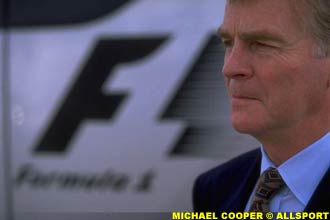
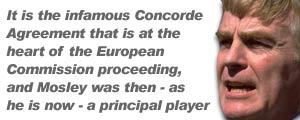 Briefly stated, after absorbing both the Commission's 188 page Statement of Objections and the 107 page Response of the FIA, the main claims against Formula One come down to these: the Commission believes that the manner in which the FIA claims the exclusive right to issue licenses to those who wish to organize or compete in international motorsports and the manner in which the FIA claims and exploits the commercial broadcasting rights to the international championships the FIA organizes violates the antitrust principles of European Commission "Competition Law".
Briefly stated, after absorbing both the Commission's 188 page Statement of Objections and the 107 page Response of the FIA, the main claims against Formula One come down to these: the Commission believes that the manner in which the FIA claims the exclusive right to issue licenses to those who wish to organize or compete in international motorsports and the manner in which the FIA claims and exploits the commercial broadcasting rights to the international championships the FIA organizes violates the antitrust principles of European Commission "Competition Law".
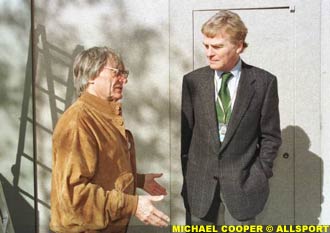
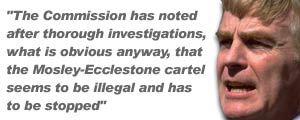 If the BPR complaint appears to have gone away quietly, the other private complainant - AE TV - is an entirely different kettle of fish and has matched the FIA's ferocity with its own guerilla warfare, conducted in the courts, on the internet, in the traditional press and, of course, within the European Commission itself.
If the BPR complaint appears to have gone away quietly, the other private complainant - AE TV - is an entirely different kettle of fish and has matched the FIA's ferocity with its own guerilla warfare, conducted in the courts, on the internet, in the traditional press and, of course, within the European Commission itself.
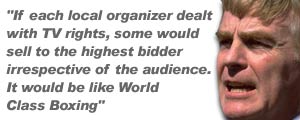 Unlike BPR, AE TV has not settled its case with the FIA and Bernie's companies and
Unlike BPR, AE TV has not settled its case with the FIA and Bernie's companies and 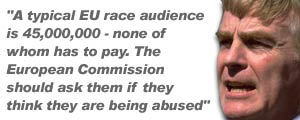 What is the FIA's response to this? The FIA sees nothing but chaos in a world of separate deals with individual promoters and track owners, reduced and non-uniform safety standards, drivers racing under dangerous conditions and fans being deprived of over-the-air terrestrial coverage of Formula One in the European Union.
What is the FIA's response to this? The FIA sees nothing but chaos in a world of separate deals with individual promoters and track owners, reduced and non-uniform safety standards, drivers racing under dangerous conditions and fans being deprived of over-the-air terrestrial coverage of Formula One in the European Union.
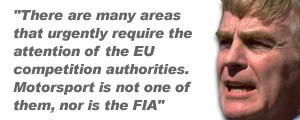 Plainly, the most immediate side-effect of following the European Commission's prescriptions would be the elimination of the over-the-air television coverage of Formula One that citizens in European Union countries have come to expect on Grand Prix Sundays. Again, the FIA's official position:
Plainly, the most immediate side-effect of following the European Commission's prescriptions would be the elimination of the over-the-air television coverage of Formula One that citizens in European Union countries have come to expect on Grand Prix Sundays. Again, the FIA's official position: